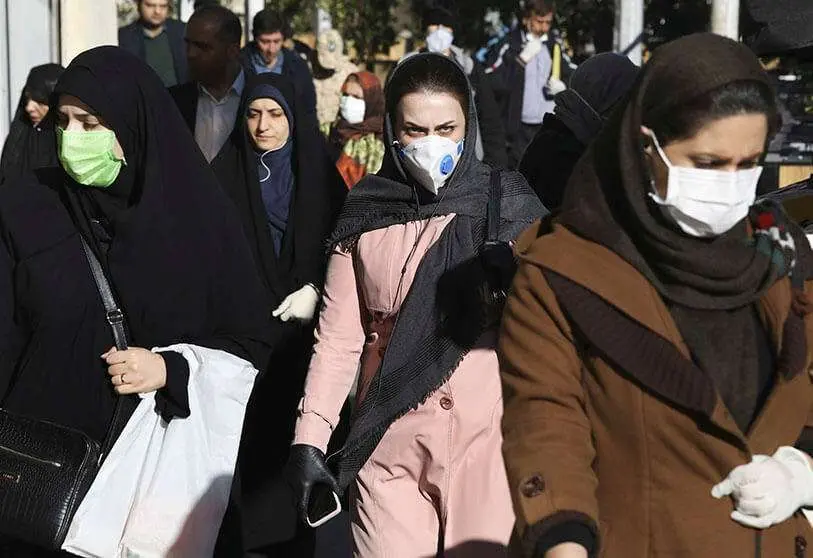The coronavirus and the crisis in the Islamic Republic

The Iranian regime has been celebrating the 40th anniversary of the Revolution in the midst of one of the deepest legitimacy crises in the history of the Islamic Republic. The last six months have been especially hard on the Iranian ruling class, which has had to face three major internal crises in addition to US sanctions. The first came in the autumn of 2019, when mass protests broke out in several of the country's industrial cities over rising fuel prices. The government's response was forceful: excessive police violence - which Amnesty International says has left at least 300 people dead - was followed by a strategic Internet shutdown to prevent images of the protests from being broadcast.
The second crisis came soon after: in late 2019 there was an escalation of tension between the Islamic Republic and the US in Iraq that resulted in the assassination of the renowned Iranian general Qasem Soleimani and the tragic accidental shooting down of a passenger plane by Iranian air defences. Although the regime apologized for the accident and tried to show its internal strength with a massive funeral in honor of the missing general, the discontent of part of the Iranian population is evident. The turnout in the legislative elections of 21 February was the lowest in the history of the Islamic Republic, at 42 per cent.
The victory of the list most closely linked to the regime's apparatus - self-described as “fundamentalist” for remaining faithful to the foundations or principles of the revolution - is the direct result of the high abstention.
The third crisis has broken out shortly after the elections and threatens to further undermine the credibility of the regime's institutions. The Coronavirus is spreading unchecked in an Iran strangled by sanctions - which prevent the import of medicines and medical supplies - whose government has failed to act decisively in the first weeks of the epidemic. The virus, whose mortality rate in Iran exceeds that of China or Italy, has infected very prominent figures in the regime, such as Vice President Masumeh Ebtekar, a veteran of the kidnapping of the U.S. embassy during the revolution. Perhaps the most striking case has been that of Iraj Harirchi, deputy minister of health, who a week ago announced on television that he had contracted the disease a day after claiming that everything was under control.
At the time of writing, the number of infected people exceeds 1,500, with at least 66 deaths. The focus of the outbreak appears to be the seminary city of Qom, although most cases are concentrated in Tehran. As in other countries, sanitary masks and disinfectant soap have been sold out in many shops, and the government has begun a campaign to sanction speculators. The death of Mohammed Mirmohammadi, a 70-year-old direct advisor to Supreme Leader Khamenei, has further alarmed the aging Iranian leadership, many of whom are in the risk group. For the time being, parliamentary activity has been suspended, as have classes in schools and universities, although religious shrines in Qom remain open, with dozens of believers kissing the tombs and sacred monuments without fear of contagion.
Although the Iranian health system is one of the strongest in the region and has highly trained personnel, the increase in the number of Coronavirus cases may push it to the limit. A shortage of masks and medical supplies increases the likelihood that doctors, nurses and assistants will become infected. Poor government management during the early days of the epidemic - lack of transparency, absence of control measures and underestimation of risk - has caused the disease and associated rumours to spread out of control. Although serious prevention and disinfection measures have been implemented during the last week, it is expected that the number of infected and deaths will increase during the next few days before the outbreak stabilizes.
The Persian New Year, which is celebrated on 21 March, presents a dilemma for Iranian managers. On the one hand, the popular holiday, when families go outdoors and visit each other, is a potential focus for the spread of the virus. On the other hand, popular discontent may grow even more if quarantines or mobility restrictions are applied. In addition, Iranian authorities, very concerned about the country's image, may want to avoid scenes of deserted streets and a country paralyzed by the epidemic and quarantines. In any case, the Coronavirus has added an unexpected element of tension that neither the regime nor the analysts specializing in Iran could have foreseen. The management of the health crisis will be crucial for the future of an Islamic Republic whose legitimacy is more than ever in question.


